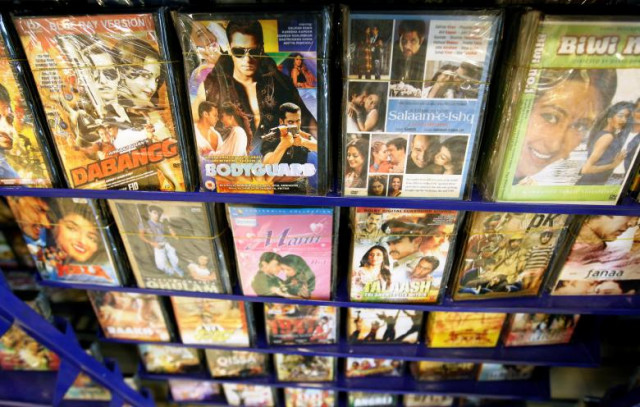Entertainment industry: World’s punching bag in times of conflict
Pakistan and India are not the only countries where artists are collateral damage during political warfare

Bollywood movies are seen on display at a video store in Islamabad, Pakistan. PHOTO: REUTERS
MNS workers arrested for protesting outside theaters against ADHM
As entertainment industry becomes the latest battleground between the two countries, we take a look at instances in the past where other political rivalries have also used artists as punching bags.
Ukraine-Russia
After Russia's annexation of Crimea in March 2014, Ukraine banned Russian films, TV dramas and documentaries made since January 1, 2014 in what Kiev regarded as "an aggressor state". The ban followed other restrictive measures imposed by Russia and Ukraine on each other since the conflict, which included their main TV channels.
Ukraine also blacklisted 83 cultural figures, most of them Russian, whom it considered a national security threat. Those on the list, barred from visiting Ukraine, mostly supported Russia's annexation of Crimea and the pro-Russian insurgency in eastern Ukraine.
Similarly, Russia banned many Ukrainian performers including many pop and rock stars popular in Russia. A Russian court also jailed Ukrainian filmmaker for 20 years for plotting terrorist acts in Crimea.
China-USA
In 2007, Chinese authorities unofficially banned the release of American movies for at least three months. The ban, not announced in writing, was a result of growing rift between China and the US. During this time, China had expressed its displeasure over the US sale of weapons to Taiwan and objected to Congress honouring the Dalai Lama.
Won’t engage with Pakistani talent under current circumstances, says Karan Johar
China works under a quota system which already restricts foreign movie imports to 34 titles a year on a revenue-sharing basis. The agreement was signed with the World Trade Organization in 2012 and is valid for five years. Before 2012, the quota was for only 20 films.
South Korea-North Korea
In the 1970’s, the South Korean cinema faced extreme censorship under its leader’s so-called ‘Revitalizing Reforms’ which oppressed the industry to such an extent that it was pushed into a period of depression. The restrictions were aimed at avoiding harm to the pride and dignity of South Korea and praise or support of North Korea and communism. Due to these restrictions, filmmakers were not allowed to produce films they wanted and many were blacklisted and even imprisoned.
Whereas, the industry in North Korea has always been relatively backward because of its isolation in global arena, which also means its filmmakers rarely get the opportunity to work with foreign artists.
Fun fact: In the 80s, North Korean leader Kim Jong Il, an ardent movie buff, ordered the abduction of a South Korean film director and his actor wife to produce better quality movies than those made by his countrymen.
USA-Cuba
Since the American embargo on Cuba in the 1960s, US audiences have been able to watch Cuban films only through film festivals and third-party intermediaries, while Cubans have been able to watch American movies and TV shows only through piracy.
The sanctions, imposed because of Cuba’s alignment with the communist powers, make transferring money to Cuba illegal if not authorised by United States Treasury Department. This prevents Americans from investing in Cuban movies and prohibits Americans from making most films on the island. In one case, a Cuban filmmaker who raised money on the crowd-funding site Indiegogo.com for his project had the campaign suspended and the money frozen, as it was illegal for the US-based website to transfer funds to Cuba or a Cuban resident.
ADHM in trouble? Indian cinema owners officially boycott films with Pakistani actors
The embargo also means Cubans cannot buy advanced production and exhibition materials directly from the US and have to go through intermediaries and third-party countries which inflates the cost by up to 20%. This has also led to shutting down of many theatres in Cuba as the management could not keep up with the increasing expenses.
US President Barack Obama recently relaxed several of the prohibitions on trade and travel but many remain in place and can only be removed by legislation.



















COMMENTS
Comments are moderated and generally will be posted if they are on-topic and not abusive.
For more information, please see our Comments FAQ